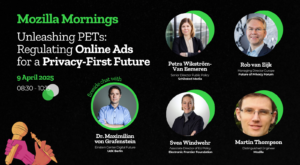Welcome to the first blog of the series “Behind the Manifesto,” where we unpack core issues that are critical to Mozilla’s mission. The Mozilla Manifesto represents Mozilla’s commitment to advancing an open, global internet. This blog series digs deeper on our vision for the web and the people who use it, and how these goals are advanced in policymaking and technology.
At Mozilla, we’ve long said the internet is one of the world’s most important public resources, something that only thrives when guided by core principles. One of those principles is that individual security and privacy online are fundamental.
Encryption is the technology that makes secure and private online interactions possible. It protects our messages, our data, and our privacy, sitting in the center of security and trust on the internet. Given its critical role in online privacy, it can be a focal point for policymakers.
| The truth is, encryption is integral to digital trust and safety. Strong encryption keeps us safe while weak encryption puts our personal, financial, and health data at risk. |
In recent years, we’ve seen governments around the world test ways to undermine encryption to access private conversations and data, often framing it as critical to combating crime. From proposals in the EU that could allow law enforcement to read messages before they are encrypted, to the UK Government’s pushback on Apple’s rollout of iCloud end-to-end encryption, or U.S. legislation that would require platforms to provide access to encrypted data, the pressure to weaken encryption is growing globally.
Governments and law enforcement agencies face complex and legitimate challenges in protecting the public from serious crime and emerging online threats. Their work is critical to ensuring safety in an increasingly digital world. But weakening encryption is not the solution. Strong encryption is what keeps everyone safe — it protects citizens, officials, and infrastructure alike. It is the foundation that safeguards people from intrusive surveillance and shields their most sensitive data from those who would exploit it for harm. We must work together to find solutions that both uphold public safety and prevent the erosion of the privacy and security that strong encryption provides.
With encryption increasingly under threat, this year’s Global Encryption Day (October 21) is the perfect moment to reflect on why strong encryption matters for every internet user.
At Mozilla, we believe encryption isn’t a luxury or privilege. It is a necessity for protecting data against unauthorized access. Our commitment to end-to-end encryption is strong because it is essential to protecting people and ensuring the internet remains open and secure.
That’s why Mozilla has taken action for years to protect and advance encryption. In 2023, we joined the Global Encryption Coalition Steering Committee, working with partners around the world to promote encryption and push back on proposals for backdoor access.
In the U.S., we’ve advanced encryption in our 2025 U.S. policy priorities, joined amicus briefs, and raised concerns with bills like the U.S. EARN IT Act. In the EU, we ran a multi-year campaign on the eIDAS Regulation working alongside civil society, academics, and industry experts to address concerns that Article 45 threatened to undermine the encryption and authentication technologies used on the web. With such a massive risk to web security, Mozilla, with allies, took action, releasing detailed position papers and joint statements. All of our efforts have been to safeguard encryption, privacy, and digital rights. Why? Because the bottom line is simple: backdoor policies diminish the trust that allows the web to be a safe and reliable public resource.
Mozilla’s strong commitment to protecting privacy isn’t just a policy priority; it’s the foundation of our products and initiatives. Below, we’d like to share some of the ways in which Mozilla partnered with allies to make encryption a reality and a core function of the open internet ecosystem.
- Mozilla is among the co-founders of Let’s Encrypt, a nonprofit Certificate Authority run by the Internet Security Research Group (ISRG), alongside partners like the EFF and the University of Michigan. This project made HTTPS certificates free and automatically renewable, transforming HTTPS from a costly, complex setup into a default expectation across the web. As a result, the share of encrypted traffic skyrocketed from less than 40% in 2016 to around 80% by 2019.
- Mozilla closely collaborated with Cloudflare to roll-out Encrypted Client Hello (ECH) in Firefox in 2023, which encrypts the first “Hello” message of a user’s TLS connection so that even the website name is hidden from network observers.
- Mozilla has most recently set a new standard for certificate revocation on the web, advancing encryption and security. In April 2025, Firefox became the first (and is still the only) browser that has deployed CRLite, the technology invented by a group of researchers that ensures revoked HTTPS certificates are identified quickly and privately without leaking unencrypted browsing activity to third parties.
- In 2024, Firefox became the first browser to support DTLS 1.3 providing the most robust end-to-end encryption of real-time audio and video data, including all your web conferencing.
It’s easy to say we care about encryption, but it only works if the commitment is shared by the policymakers writing our laws and the engineers designing our systems.
As Neha Kochar, Director of Firefox Security and Privacy puts it: “Whether you’re visiting your bank’s website or sending a family photo, Firefox works behind the scenes to keep your browsing secure. With no shareholders to answer to, we serve only you — open-source and transparent by design, with verifiable guarantees that not even Mozilla knows which websites you visit or what you do online.”
That is why Global Encryption Day is such an important moment. If a system is weakened or broken, it opens vulnerabilities that anyone with the right tools can exploit. By standing up for encryption and the policies that protect it, we help ensure the internet remains safe, open, and fair for everyone.
To dig deeper on encryption, check out these partner resources: Global Encryption Coalition, Internet Society and Global Partners Digital.
This blog is part of a larger series. Be sure to follow Jenn Taylor Hodges and Sema Karaman on LinkedIn for further insights into Mozilla’s policy priorities.










